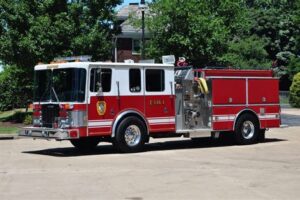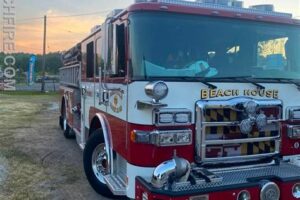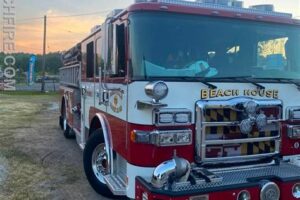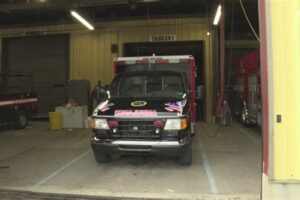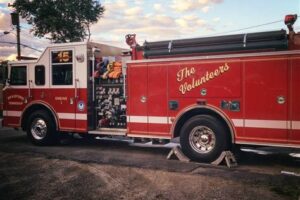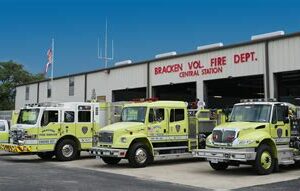Table of Contents
Discover the essential qualifications required to become a volunteer fire chief. This concise guide outlines the necessary skills, experience, and certifications needed to lead a dedicated team of firefighters in protecting and serving the community. Explore the qualities that make a successful volunteer fire chief and learn how to take the first steps towards this impactful leadership role.
When it comes to protecting our communities and saving lives, there are few positions as crucial as that of a Volunteer Fire Chief. This role requires exceptional leadership skills, extensive firefighting experience, and a deep commitment to public safety. It is not a position for the faint-hearted or the inexperienced. To become a Volunteer Fire Chief, one must possess a unique combination of physical strength, mental fortitude, and the ability to make split-second decisions under intense pressure. In this article, we will delve into the qualifications and characteristics that make an individual suitable for this esteemed position.
Introduction
Volunteer firefighters play a crucial role in ensuring public safety in communities across the country. These dedicated individuals selflessly dedicate their time and effort to protect lives and property during emergencies. At the heart of every successful volunteer fire department is a competent and capable fire chief who provides leadership, direction, and expertise. In this article, we will explore the qualifications required to become a volunteer fire chief.
Experience as a Volunteer Firefighter
One of the most important qualifications for a volunteer fire chief is experience as a volunteer firefighter. This hands-on experience provides invaluable knowledge and understanding of the challenges and demands of firefighting. It allows the chief to effectively lead and communicate with the team, as they have first-hand experience with the duties and responsibilities involved.
Leadership Skills
A volunteer fire chief must possess strong leadership skills to effectively manage the department. This includes the ability to make sound decisions under pressure, delegate tasks, and motivate team members. Effective communication and problem-solving skills are also essential to ensure seamless coordination and cooperation within the department.
Knowledge of Firefighting Techniques and Procedures
A volunteer fire chief should have a comprehensive understanding of firefighting techniques and procedures. This includes knowledge of fire behavior, safety protocols, equipment usage, and incident command systems. Staying updated with the latest advancements in firefighting technology and techniques is crucial as well.
Emergency Medical Training
Alongside firefighting skills, a volunteer fire chief should have adequate emergency medical training. This includes certifications such as CPR (Cardiopulmonary Resuscitation), first aid, and potentially advanced training like EMT (Emergency Medical Technician) certification. These skills allow the chief to provide immediate medical assistance during emergencies until professional medical help arrives.
Management and Administrative Skills
In addition to operational expertise, a volunteer fire chief needs strong management and administrative skills. This involves budgeting, resource allocation, record-keeping, and coordinating with other agencies or departments. A chief must also ensure compliance with relevant laws, regulations, and reporting requirements.
Training and Education
Continuous training and education are vital for a volunteer fire chief to stay up-to-date with industry best practices. Attending workshops, seminars, and specialized training programs enhances knowledge and skills in areas such as incident command, hazardous materials handling, and leadership development. Pursuing fire science degrees or certifications can further enhance qualifications.
Physical Fitness and Wellness
Firefighting is a physically demanding profession, and a volunteer fire chief must be physically fit and healthy. Maintaining an active lifestyle, regularly exercising, and following a nutritious diet are important for maintaining peak physical condition. This ensures the chief can actively participate in firefighting operations and serve as a role model for the team.
Community Involvement
A volunteer fire chief should have a strong sense of community involvement and dedication. They should actively engage with the community, participating in public events, educating residents about fire safety, and building relationships with local organizations and leaders. Being accessible and approachable to community members fosters trust and support.
Ethics and Integrity
Integrity is of utmost importance for a volunteer fire chief. They must demonstrate high ethical standards, honesty, and accountability in their actions and decisions. Upholding the values of the fire service profession and ensuring the department operates with transparency and fairness are essential qualities for a successful fire chief.
Continual Personal and Professional Growth
A good volunteer fire chief never stops learning and growing. They actively seek opportunities to expand their knowledge, improve skills, and stay updated with industry trends. By continually investing in personal and professional growth, a fire chief can provide better guidance and mentorship to their team, ultimately benefiting the entire department and community.
Conclusion
Becoming a volunteer fire chief requires a combination of experience, skills, and personal qualities. From firefighting expertise and leadership skills to community involvement and personal growth, a fire chief must possess a diverse range of qualifications. By embodying these qualities, volunteer fire chiefs can effectively lead their departments and ensure the safety and well-being of their communities.
Volunteer Fire Chief Qualifications: Ensuring Exceptional Leadership and Expertise
When it comes to the role of a Volunteer Fire Chief, exceptional leadership and expertise are essential qualities that cannot be overlooked. With the responsibility of managing a team of dedicated firefighters and ensuring the safety of their community, Volunteer Fire Chiefs must possess a range of qualifications that enable them to excel in their role. From firefighting experience to problem-solving abilities, each qualification plays a crucial role in guiding and motivating the team, fostering effective interagency relations, and upholding safety standards.
Firefighting Experience: A Prerequisite for Effective Management
Possessing extensive firefighting experience is a prerequisite for any Volunteer Fire Chief. This qualification ensures that the individual has firsthand knowledge and understanding of the field, enabling them to lead and guide their team effectively during emergency situations. A successful Volunteer Fire Chief should have spent a considerable amount of time serving on the front lines, responding to a wide range of fire incidents, and honing their skills. This experience instills confidence in both the team and the community, as they trust in the expertise and capabilities of their leader.
Leadership Skills: Guiding and Motivating the Team
Effective leadership skills are paramount for a Volunteer Fire Chief. They must possess the ability to guide and motivate the team, ensuring that each member performs to the best of their abilities. A successful Volunteer Fire Chief should be adept at decision-making, delegating tasks efficiently, and providing clear directions during high-stress situations. By setting a positive example, inspiring trust, and fostering a sense of camaraderie, a Volunteer Fire Chief can create an environment that encourages growth, teamwork, and dedication among their firefighters.
Excellent Communication: Fostering Effective Interagency Relations
Clear and concise communication is crucial for a Volunteer Fire Chief to establish and maintain positive working relationships with other agencies, such as police departments and emergency medical services. This qualification enables effective coordination during multijurisdictional incidents, ensuring timely and efficient emergency responses. A Volunteer Fire Chief should possess excellent verbal and written communication skills to convey critical information accurately and efficiently. By fostering effective interagency relations, a Volunteer Fire Chief can enhance the overall emergency response capabilities of their community.
Training and Education: Continual Pursuit of Knowledge
A Volunteer Fire Chief should continuously seek further education and training opportunities to stay updated with the latest firefighting techniques, emergency management practices, and regulatory changes. This qualification ensures that the Volunteer Fire Chief is equipped with the necessary knowledge to implement best practices, adhere to safety standards, and train their team effectively. By prioritizing continual learning, a Volunteer Fire Chief demonstrates their commitment to excellence and the continuous improvement of their department.
Problem-Solving Abilities: Handling Complex Situations
Quick thinking and effective problem-solving abilities are indispensable qualifications for a Volunteer Fire Chief. They must remain calm and composed in high-pressure situations, exhibiting exceptional decision-making skills. A successful Volunteer Fire Chief should possess the capability to analyze and assess complex incidents swiftly, devising appropriate strategies, and ensuring the safety of their team and the community. By demonstrating strong problem-solving abilities, a Volunteer Fire Chief instills confidence in their team and inspires trust in their ability to handle any situation that may arise.
Personnel Management: Nurturing a Cohesive Unit
Managing a diverse team of volunteers is a key responsibility for a Volunteer Fire Chief. This qualification entails the ability to recruit, train, and retain personnel, fostering a sense of teamwork and commitment within the unit. A successful Volunteer Fire Chief should possess interpersonal skills, ensuring effective communication, conflict resolution, and recognition of their team members’ contributions. By nurturing a cohesive unit, a Volunteer Fire Chief creates an environment that promotes collaboration, growth, and the overall success of the department.
Commitment to Safety: Upholding Standards and Best Practices
A Volunteer Fire Chief must have an unwavering commitment to safety. This qualification ensures that they consistently enforce safety protocols, implement risk management strategies, and promote a culture of safety within the department. A successful Volunteer Fire Chief should prioritize the well-being of their team and the community, actively seeking ways to minimize risks and prevent accidents. By upholding safety standards and best practices, a Volunteer Fire Chief sets the foundation for a department that operates with the highest level of professionalism and efficiency.
Collaborative Approach: Building Community Partnerships
Building strong partnerships within the community is a vital qualification for a Volunteer Fire Chief. By collaborating with local organizations, businesses, and residents, they can foster a sense of shared responsibility and enhance emergency response capabilities. A successful Volunteer Fire Chief should possess excellent networking and relationship-building skills, leveraging community support and resources for the betterment of the fire department and the community they serve. By taking a collaborative approach, a Volunteer Fire Chief strengthens the bond between the department and the community, ultimately creating a safer and more resilient environment for all.
Qualifications for a Volunteer Fire Chief
In order to effectively lead a team of dedicated volunteers and ensure the safety of their community, volunteer fire chiefs must possess a specific set of qualifications. These qualifications encompass a combination of experience, knowledge, and personal qualities that are essential for this demanding role.
1. Experience:
- Extensive experience as a firefighter: A volunteer fire chief should have considerable hands-on experience in firefighting operations. This allows them to understand the challenges faced by their team members and make informed decisions during emergencies.
- Leadership experience: Prior leadership roles within the fire service or other relevant organizations demonstrate the ability to effectively manage personnel, coordinate resources, and make critical decisions under pressure.
- Training and certifications: A volunteer fire chief should possess all necessary certifications and training required for firefighting and emergency management. This includes certifications in incident command, hazardous materials response, and rescue operations.
2. Knowledge:
- Firefighting tactics and strategy: A deep understanding of firefighting techniques, equipment, and best practices is essential for a volunteer fire chief. They should be up-to-date with the latest industry standards and innovations.
- Emergency management: Knowledge of emergency management principles, such as incident command systems and disaster response protocols, allows the chief to effectively coordinate resources and response efforts during emergencies.
- Community awareness: An understanding of the local community, including its demographics, geography, and potential hazards, enables the chief to develop appropriate prevention and preparedness strategies.
3. Personal Qualities:
- Strong communication skills: Excellent verbal and written communication skills are crucial for a volunteer fire chief. They must be able to effectively convey instructions, provide clear direction, and communicate with various stakeholders, including team members, local authorities, and the public.
- Decision-making ability: A volunteer fire chief faces numerous complex decisions during emergencies. The ability to make sound judgments quickly, based on available information and experience, is vital for the safety of both the team and the community.
- Team-building and motivational skills: The chief must have the ability to inspire and motivate their team, fostering a culture of unity, professionalism, and dedication. They should also possess strong interpersonal skills to resolve conflicts and build effective relationships with team members.
Conclusion:
A volunteer fire chief holds a critical position within a firefighting organization, requiring a combination of experience, knowledge, and personal qualities. With the right qualifications, they can lead their team effectively, ensuring the safety and well-being of their community during emergencies.
Thank you for visiting our blog and taking the time to read about the qualifications required to become a Volunteer Fire Chief. We hope that the information provided has been helpful and informative to you. In this closing message, we would like to summarize the key points discussed in the article and emphasize the importance of these qualifications in fulfilling the role of a Volunteer Fire Chief.
First and foremost, it is crucial to have relevant firefighting experience when aspiring to become a Volunteer Fire Chief. This experience not only provides you with the necessary knowledge and skills to handle emergency situations effectively but also earns the respect and trust of your fellow firefighters. Transitioning from a firefighter to a chief means taking on increased responsibilities, such as leading a team and making critical decisions under pressure. Therefore, having a solid foundation in firefighting is essential.
In addition to firefighting experience, leadership qualities are paramount for a Volunteer Fire Chief. As a chief, you will be responsible for managing and coordinating the activities of your fire department, including training, scheduling, and budgeting. Strong leadership skills, such as effective communication, problem-solving abilities, and the ability to motivate and inspire others, are vital in ensuring the smooth operation of the department and the safety of both your team and the community you serve.
Lastly, a Volunteer Fire Chief must possess excellent organizational and administrative skills. This involves keeping accurate records, maintaining equipment and apparatus, and ensuring compliance with regulations and protocols. The ability to multitask, prioritize tasks, and manage resources efficiently is essential in running a successful fire department. Additionally, being knowledgeable about relevant laws, codes, and regulations ensures that your department operates within legal boundaries and maintains a high level of professionalism.
In conclusion, becoming a Volunteer Fire Chief requires a combination of firefighting experience, leadership qualities, and strong organizational skills. It is a challenging yet rewarding role that plays a crucial part in ensuring the safety and well-being of the community. We hope that this article has provided you with valuable insights into the qualifications necessary to pursue this position. If you are passionate about serving your community and possess these qualifications, we encourage you to take the next steps towards becoming a Volunteer Fire Chief. Your dedication and commitment can make a real difference in the lives of others.
Thank you once again for visiting our blog, and we wish you all the best in your future endeavors!
.
People also ask about Volunteer Fire Chief qualifications:
What qualifications are required to become a Volunteer Fire Chief?
- A minimum age requirement, often between 18 and 21 years old.
- Completion of basic firefighter training and certification.
- Several years of experience as a volunteer firefighter.
- Strong leadership skills and the ability to manage a team.
- Excellent communication and interpersonal skills.
- Knowledge of fire safety regulations and emergency response procedures.
- Physical fitness and the ability to perform demanding firefighting tasks.
- Certifications in additional specialized areas such as hazardous materials handling may be preferred.
What training is necessary to become a Volunteer Fire Chief?
- Basic firefighter training: This includes classroom instruction and hands-on training in firefighting techniques, equipment usage, and emergency response procedures.
- Leadership and management training: Aspiring chiefs should receive training in leadership skills, team management, and decision-making to effectively lead their department.
- Continuing education: Volunteer Fire Chiefs should attend regular training sessions and workshops to stay updated on the latest firefighting techniques, safety protocols, and regulatory changes.
Do Volunteer Fire Chiefs receive any certifications?
- Fire Officer Certification: This certification acknowledges the chief’s proficiency in managing firefighting operations, personnel, and resources.
- Hazardous Materials Certification: This certification demonstrates the chief’s competence in handling hazardous materials incidents and coordinating appropriate response actions.
- Incident Management Certification: This certification focuses on developing skills in incident command, coordination, and communication during large-scale emergencies.
What are the responsibilities of a Volunteer Fire Chief?
- Supervising and coordinating the activities of volunteer firefighters.
- Developing and implementing fire prevention and safety programs within the community.
- Ensuring compliance with fire safety regulations and standards.
- Maintaining firefighting equipment and vehicles.
- Training and mentoring firefighters to enhance their skills and knowledge.
- Responding to emergency incidents and leading firefighting operations.
- Collaborating with other emergency response agencies and community organizations.
- Preparing budgets, managing resources, and securing funding for the department.
A Volunteer Fire Chief is typically required to have the following qualifications:
To become a Volunteer Fire Chief, individuals must undergo specific training, including:
Yes, Volunteer Fire Chiefs can obtain various certifications to enhance their qualifications and expertise, such as:
A Volunteer Fire Chief has numerous responsibilities, including:

